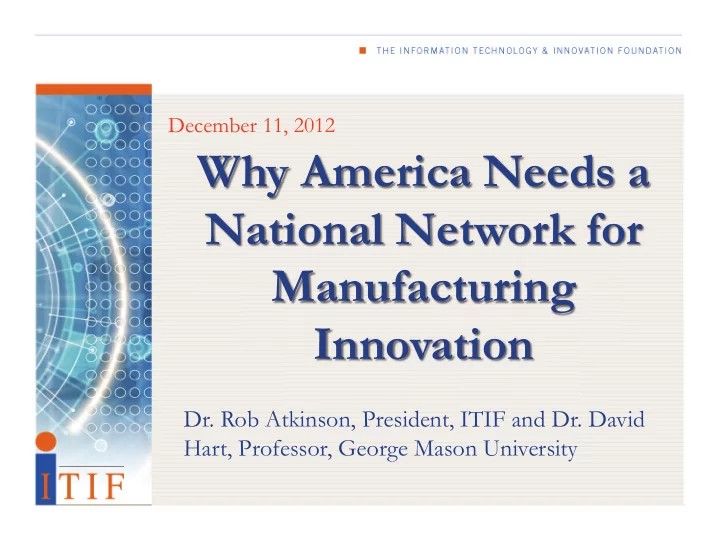

December 11, 2012 Why America Needs a National Network for Manufacturing Innovation Dr. Rob Atkinson, President, ITIF and Dr. David Hart, Professor, George Mason University
The Information Technology and Innovation Foundation (ITIF) is a Washington, D.C.-based think tank at the cutting edge of designing innovation policies and exploring how innovation will create new opportunities to boost economic growth and improve quality of life. ITIF focuses on: Innovation “verticals”: energy, life sciences, telecom, manufacturing, and Internet and IT transformation Innovation “horizontals”: trade, tax, talent, and tech policy “Innovation economics” as an alternative to mainstream economics
The Prevailing View of U.S. Manufacturing Image courtesy of http://www.soundtrack.net
The Right View of U.S. Manufacturing
But Manufacturing Jobs Have Declined Dramatically 30% 20% 10% 0% Total Jobs 1990s Manufacturing -10% Jobs 1980s -20% -30% 2000-2011 -40%
All States But One had Manufacturing Losses, 2000-2010
Why America Needs a National Manufacturing Policy We have a structural manufacturing problem Market forces alone won’t drive enough innovation to solve our problem Key competitors are already taking action
Why America Needs an NNMI Innovation is a key part of the solution and offers extraordinary opportunities today Multi-stakeholder collaboration via NNMI can expand the scale and speed the impact of innovation
National Network of Manufacturing Innovation Focus on a significant, industry-defined innovation challenge Full-service innovation hubs that support user facilities, conduct technology road-mapping, provide education and training, engage with small & medium manufacturers, and carry out applied research with an emphasis on manufacturing processes Bridge the gap between industry and academia
Source: Capturing a Domestic Competitive Advantage in Advanced Manufacturing, Advanced Manufacturing Partnership Steering Committee, 2012
A National Network
NNMI: Five Design Principles 1. Focus on significant, industry-defined innovation challenges 2. Support the full innovation process 3. Made up of independent institutes led by manufacturers 4. Select institutes through a bottom-up competitive process 5. Fund via co-investment by industry, federal government, and states
Principle #1: Focus on Significant, Industry- Defined Innovation Challenges “Industry-defined”: users know best “Focus”: build interconnected web of innovation capabilities relevant to a specific manufacturing process or other enabling technology “Significant”: big enough to make a difference to an industry or group of industries ($30-50 million per year per Institute)
Principle #2: Support the Full Innovation Process Innovation and technology hubs, not basic research facilities with tech transfer arms! Possible activities: Technology road-mapping Generic applied research Contract research User facilities and testbeds Skills standards Education and training Technical standards Initial deployment to domestic facilities
Principle #3: Made up of Independent Institutes Led by Manufacturers Diverse membership: Large, medium, and small manufacturers Research and training institutions Federal and state/regional/local governments Others, such as unions and industry associations Governed by board of directors drawn from membership that determines activities May be hosted by research institution for administrative purposes
Principle #4: Select Institutes Through a Bottom-up Competitive Process Collaborative industry-led teams propose innovation focus areas New federal NNMI program led by NIST runs competition, with participation from federal mission agencies NNMI program evaluates, shares best practices, etc.
Principle #5: Fund Via Co-investment by Industry, Federal Government, and States Industry “skin in the game” (~50% per IMI) is essential to maintain focus and draw talent Institutional support, project support, detailees Federal funding (~35%) declining over time States (~15%) may support SME membership Contract research, IP licenses may supplement 25 IMIs x $40 million/year = $1 billion/year from all sources
Conclusion: Why America Needs NNMI We have a structural manufacturing problem Innovation is a key part of the solution and offers extraordinary opportunities today Key competitors are already taking action Market forces alone won’t drive enough innovation to solve our problem Multi-stakeholder collaboration via NNMI can expand the scale and speed the impact of innovation
Thank You Follow ITIF: facebook.com/innovationpolicy www.innovationfiles.org www.youtube.com/techpolicy www.itif.org www.twitter.com/ITIFdc
Recommend
More recommend